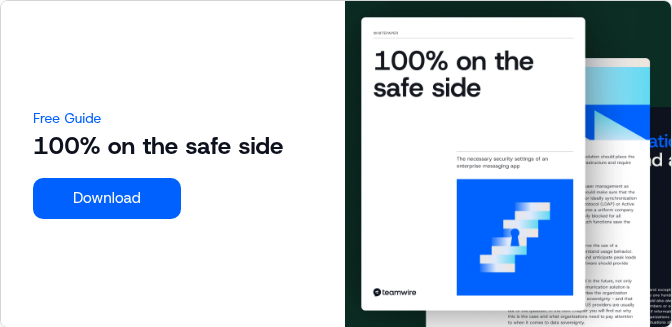C-Level Communication: Challenge of Instant Messengers & Email
Traditional communication tools like email are increasingly being replaced by instant messengers due to their quick and straightforward communication channels. However, this shift comes with risks:
- Privacy Issues with the CLOUD Act: Many American messenger services are subject to the CLOUD Act, which allows intelligence agencies and law enforcement to access user data. This can lead to privacy issues and conflicts with strict EU data protection requirements such as the GDPR.
- Inadequate User Administration: Private messenger services lack adequate management and control features for businesses. They do not allow for pre-configured service usage, employee administration, or mechanisms to lock accounts in case of employee departures or device losses.
Security Risks of Standard Messengers Like WhatsApp
While standard messengers like WhatsApp are widely used in the private sector, they pose significant risks for C-level communication:
- Protection of Confidential Data: Sensitive and confidential information can be accidentally shared or forwarded. There is no way to secure sensitive data effectively.
- Security Vulnerabilities: These messengers often do not offer secure storage on devices and are vulnerable to cyberattacks.
- Compliance Issues: Using standard messengers can violate data protection regulations like the GDPR (e.g., access to address book contacts and sharing of confidential information).
- Lack of Control: Companies cannot manage users and devices or enforce rules for data access and sharing, which adds risks.
Security Gaps in Collaboration Tools with Chat Functions
Collaboration tools like MS Teams, which also offer chat functions, also have security weaknesses:
- Privacy Issues: American services often use data centers from Google, Microsoft, and AWS, which are frequently criticized by European data protection authorities and legally allow access by US authorities.
- Uncontrolled Invitations: Users can invite others into the tool without restrictions on external communication, enabling uncontrolled access and information leakage.
- Profile Authenticity Verification: There are limited ways to verify the authenticity of profile pictures and names, increasing the risk of CEO fraud.
- Lack of End-to-End Encryption: Many collaboration tools only encrypt chat messages during transport and store them unencrypted on servers, making them unsuitable for exchanging sensitive data.
Special Security Requirements for C-Level Communication
C-level communication requires a particularly high level of security. Trade secrets and information about ongoing business negotiations are invaluable. A security breach can result in significant financial losses, lasting reputational damage, or the loss of trade secrets. Therefore, choosing a communication tool that meets high data protection and security standards and protects against unauthorized access is essential.
Challenges in Communicating with C-Level Executives
Communication between C-level executives is critical not only in times of crisis but also in everyday operations. Common challenges include:
- Time Management: The often-packed schedules of C-level executives make it difficult to arrange lengthy meetings. Efficient communication solutions are needed to facilitate quick and concise coordination. Apps with a simple and intuitive user interface, like a good messenger, are particularly suitable here.
- Protecting Sensitive Data: Highly sensitive information is often discussed at the C-level. Communication channels must be secured with comprehensive security measures to prevent hacking and data leaks.
- Shadow IT as a Threat: Shadow IT includes using devices or software outside the IT department’s control, such as Dropbox or WhatsApp. These unauthorized tools can cause security gaps, data protection violations, and disrupted workflows. A secure messenger for businesses is therefore essential to minimize such risks. Learn more about Shadow IT in this article.
- Communicating Complex Topics: C-level topics like corporate strategy, financial planning, risk management, and personnel management require precise and detailed communication. Powerful tools are needed to handle the high information density.
Best Practices for Secure C-Level Communication
Use Appropriate Tools
Choose communication solutions with an intuitive interface that is perfect for easy and efficient communication between executives and facilitates quick decision-making. Ensure comprehensive encryption for secure real-time communication to maintain confidentiality. Additionally, the tool should allow for all necessary administrative configurations for users, devices, and data.
Establish Confidential Communication Channels
Set up distribution lists for departments, staff departments, etc., to expedite setting up C-level group chats. Also, consider using broadcasts in the messenger, which provide C-level executives with an effective and personal channel to easily disseminate information to their areas and employees.
Schedule Regular Meetings
Regular meetings and short update meetings are essential to keep all executives informed and coordinate strategic decisions. Flexible online meetings offer additional flexibility due to being location-independent and enable quick responses to changes.
Define Clear Communication Guidelines
Establish clear guidelines for information sharing and the use of communication tools within the company. These guidelines ensure consistent standards and procedures and prevent misunderstandings while ensuring the safe use of selected communication tools.
Protect Sensitive Information
Use specialized communication platforms that offer the highest security standards. Encrypted messages and secure video calls are essential for protecting sensitive information. It’s also important to have control mechanisms for accessing and exchanging confidential data. Additionally, you should be able to lock devices and remotely delete data in case of loss (Data Loss Prevention).
Ensure Data Sovereignty
A secure messenger for C-level communication should store data in a certified cloud or on-premise server, ensuring data sovereignty within your jurisdiction and not sharing data with third parties. Fundamentally, you must be able to control data storage and retention on devices and servers (e.g., through automatic retention periods).
You can find more information on relevant security settings for business messengers in our whitepaper.
Promote Collaborative Decision-Making
Broadly implement platforms like a messenger that enable real-time collaboration for C-level and across the workforce. This can speed up processes, increase productivity, and achieve network effects in collaboration. These foster transparency and a dynamic corporate culture, which can lead to more informed decisions.
Collect Feedback and Continuously Improve
Regularly gather feedback from executives to evaluate and optimize communication processes. This ensures continuous improvements and consistently efficient and secure communication.
Conclusion
Effective C-level communication is crucial for business success. Invest in user-friendly and powerful communication solutions like Teamwire to optimize your decision-making processes and achieve your strategic goals. Protect your sensitive data with secure and specialized platforms that ensure high-security standards and improve your communication processes through clear guidelines and continuous feedback.
Key Takeaways:
- Effective C-level communication is essential for business success.
- Choosing the right communication tools is critical for the efficiency, productivity, and security of collaboration.
- Data protection and security measures should be ensured by specialized business messengers like Teamwire.
- Clear communication guidelines promote transparency and consistent processes.
- Continuous feedback enables long-term optimizations.
Are you looking for the right and secure platform for your C-level communication? Learn more about the benefits of Teamwire and schedule a demo!



